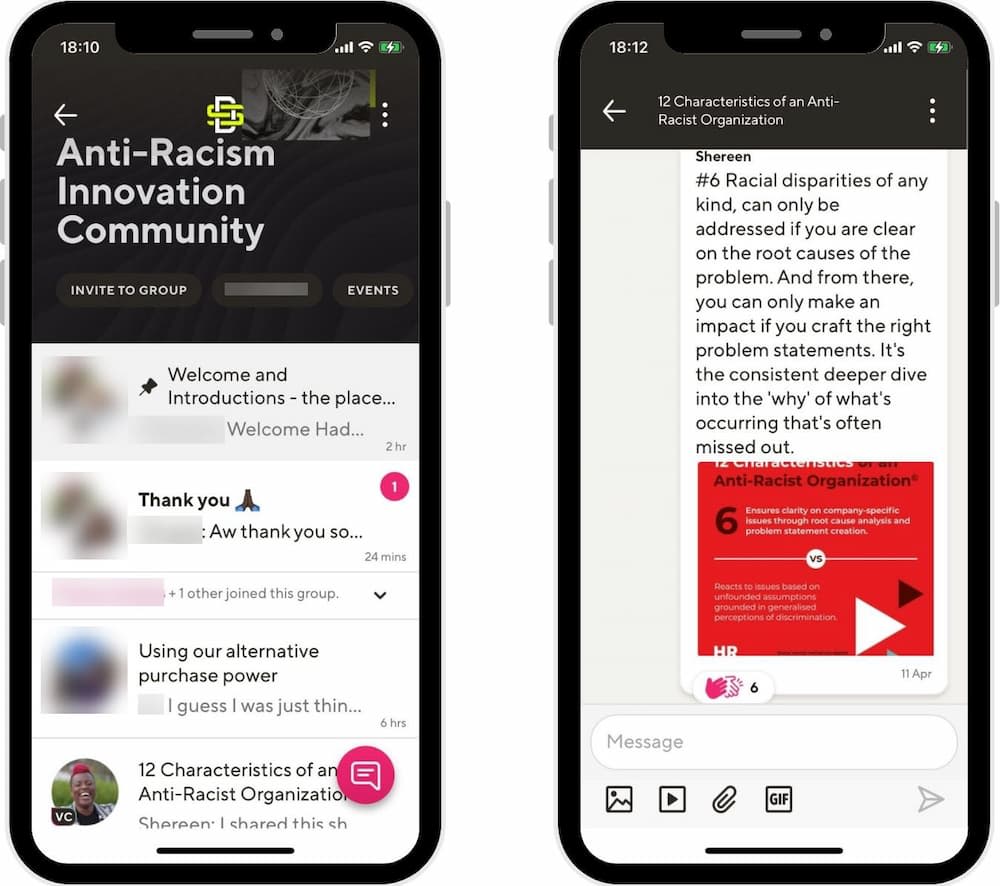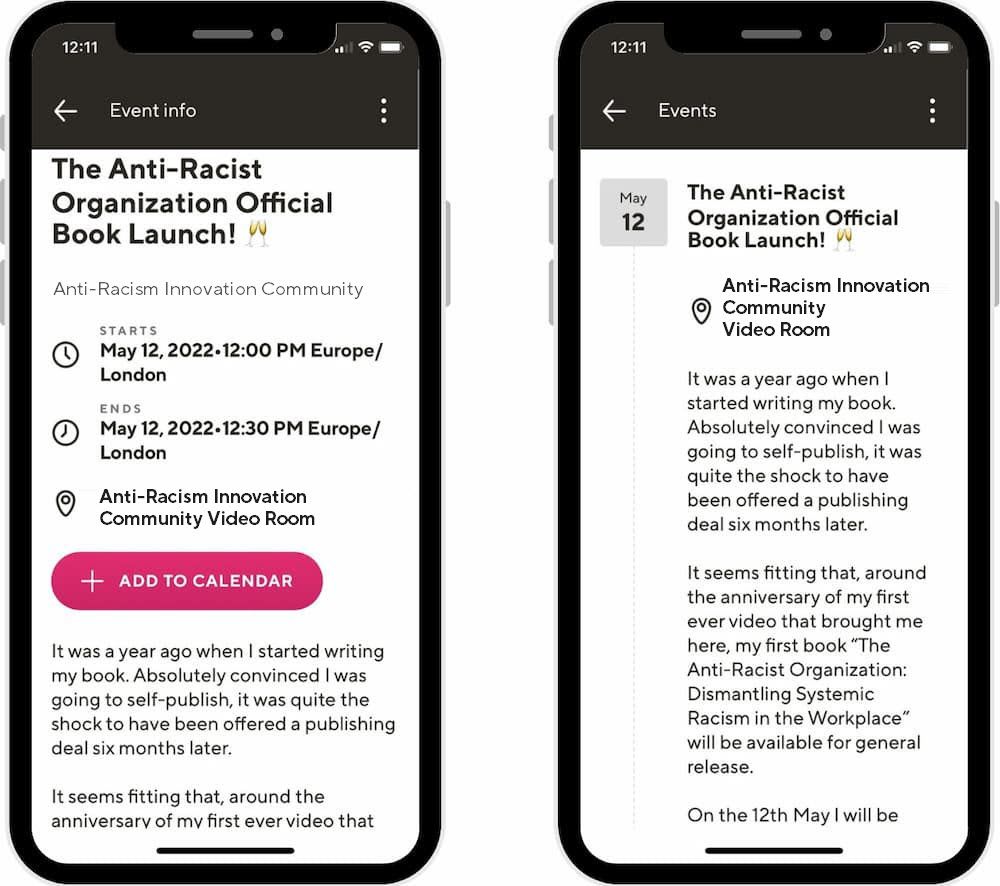In brief
Shereen Daniels is the founder of anti-racism advisory firm HR rewired. She authored The Anti-Racist Organization (Wiley, May 2022), and is Chair of the African Diaspora Economic Inclusion Foundation (ADEIF).
In 2021 Shereen Daniels was ranked first on the list of HR Most Influential Thinkers in 2021, recognising her work and expertise in racial equity and anti-racism.
Shereen is a highly-respected speaker, podcaster and influencer on anti-racism. She wanted to add to a successful social media presence by launching a private "safe space" for people championing anti-racism in their organizations.
She chose Guild to launch the Anti-Racism Innovation Community in 2022, an invite-only, carefully managed community where members are encouraged to take an active role and help and advise each other in their anti-racism work.
Shereen talked to us about the motivations behind the community, and how she and her team manage and grow the membership.
Why did you choose to create an invite-only community on Guild?
"If you're working at making your organization anti-racist, in whatever guise - officially because it's part of your remit in your job, or unofficially, because you care - then you might be wary of what you post on public social media.
Sometimes people want to say things in a safe space.
They need to ask honest questions or share a real-life experience, and it's hard to do that effectively if you're worried about the response.
I'm quite confident about what I say, but I think some people are very aware of who's potentially reading their comments on social media, and concerned it can be misconstrued.
That's probably especially true when they're concerned about their employer's reputation as well as their own. If you're a white person doing working to make an organization anti-racist, you want to ask questions, but you don't want to come across as ignorant or you’re worried that somebody might say you're racist. It's a very fine line and it can be very difficult to moderate.
On a platform like LinkedIn, I can't answer every single DM and comment. Building a less public facing community means that members can get more involved in supporting each other, which helps with their growth as well as making sure people are heard and answered.
I wanted something that was gated and more intimate where people feel they are safe to ask questions and also to share their own experiences and thoughts, and will be supported to change for the better.
I also wanted people not to feel that “I’m in Shereen’s community so I’m asking questions for Shereen to answer”. By building a community with a culture of reciprocity I can provide guidance and support when I feel I can contribute, but I only answer perhaps 10% of questions - the aim is for the community to actively support itself."

How do you manage the Anti-Racism Innovation Community and how you see it developing
"To get the community started I handpicked a few people. I deliberately didn't do a blast out to LinkedIn because this community isn't about big numbers, it’s about people who are doing the work and who care about helping others too.
Now we’ve established the community purpose and culture, we’re at a stage where people can request to join, and if it’s right for you, and us, then that’s great. If you outgrow the community or can’t participate then we’d want to make the space available to someone else.
My plan is only ever to have about 150 members at any one time and to keep the membership focused. We'll change things around at certain points, when I know there are people who are doing the [anti-racism] work, but not contributing to the community. That could be for very good reasons of course.
I'll check that they still want to be involved if they’ve never posted or interacted.
We we want to ensure we’ve got a community full of people who want to be there, and can contribute in some way. And of course with the analytics on Guild make data-informed decisions about engagement.
I feel that community is a give and take, you’ve got to participate, contribute, support, ask questions and perhaps just listen at times. The whole thing about this community is that you've got to take a bit more of an active role.
Something I see on LinkedIn is people are active but they don't contribute when people ask questions – if that's you, then this probably isn't the right community for you. I'm not trying to recreate a huge following, that's not what this community is about.
It's a safe online space for people that are doing the real work of trying change workplaces to be more anti-racist and equitable.
You’re planning to use your Guild community's Video Room for drop-in Q&As - tell us more about that
"The beautiful thing about having a separate space, that’s not LinkedIn, Twitter or Instagram is that you can do things in a much more intimate way. There are a lot of people in the community on Guild who have followed my journey from day one.
I want the people who have been part of my journey and part of the community to know that this is a special place.
So, the first Video Room event will be for my Anti-Racism Innovation Community members to join in with my book launch, and for me to ask them some questions too. I plan to work with the community to see if they want to do something similar a couple of times a year.
Video Room meet ups offers a chance to talk to people who are active to see what would they need to be even more active? Are they getting enough of what they need? Do they want other people to be active? Can we co-create our community?"

Can you tell us more about the community culture and is there an “end point” to the community?
"I would say there is no "end point" really - this is lifelong work.
If it was something more tactical or transactional perhaps we could say “you know, when people feel like they've reached this point…”. I think you always get to a point, when you’re doing the work around racism, when you get a new outlook, or a new perspective, or something doesn't quite go to plan.
There's always something else to achieve and there's a renewed need for community or something you need help with.
Some people are very active in the community, and I appreciate them for that. And they will be rewarded in other ways because they aren’t doing something because they were told to, they just decide to do something to help.
Other people in the community are quieter.
The challenge with online communities is that platforms like LinkedIn, Twitter and Instagram have made it really easy for you to be a voyeur, if that makes sense. I call it ghosting - you can just sit through a conversation.
Reciprocity/give and take is more important in a dedicated, private community – I think it's not the right place for ghosting.
With a dedicated community I want people to want to be active. People who feel like they can benefit and they can contribute at the same time."
Why did you choose Guild for your community rather than LinkedIn or another social media platform?
"LinkedIn has been amazing – part of the reason why I'm where I am is because my voice and my message and my videos were amplified predominantly on LinkedIn.
But LinkedIn is a bit like a Glastonbury Festival - providing you've got your ticket you're in. And you pretty much find your own way. You'll have great experience, but good luck trying to find that little community that you need.
That's my analogy for LinkedIn – like Glastonbury it can be good fun at times, but it has its inconveniences. We could keep going with that analogy...it definitely serves a purpose, but it's not always the right choice."
Want to join the Anti-Racism Innovation Community?
The community is private and strictly limited to people working to make organizations anti-racist, but you can apply to join as a member. Head to https://guild.co/communities/4080-anti-racism-innovation-community to find out more and request to join.
More expert-led communities on Guild
Agency Hackers builds agency leaders peer-support communities
Speciall Media builds community of practice for publishers and media owners
Race Equality Matters boosts diversity initiatives with Guild communities
Spark! Consulting builds investment community for startups and scaleups
Header image photo by Sushil Nash on Unsplash
Join Guild 🤝
See for yourself how the Guild experience is different to WhatsApp, Slack, LinkedIn or Facebook Groups. Guild is a safe space to connect, communicate and collaborate with others.
Join us on a platform that is purpose-built for professionals and businesses.
- Just want to join some groups? Simply join Guild and then look through the discoverable groups and communities to find relevant ones to join
- Thinking of running your own community? With an elegant and simple to use, mobile-first UX you’ve got everything you need to start a community - custom branding, analytics, group and user management and support. Get started with your own community here with our free and paid options
Contact us if you want to know more or have any questions.